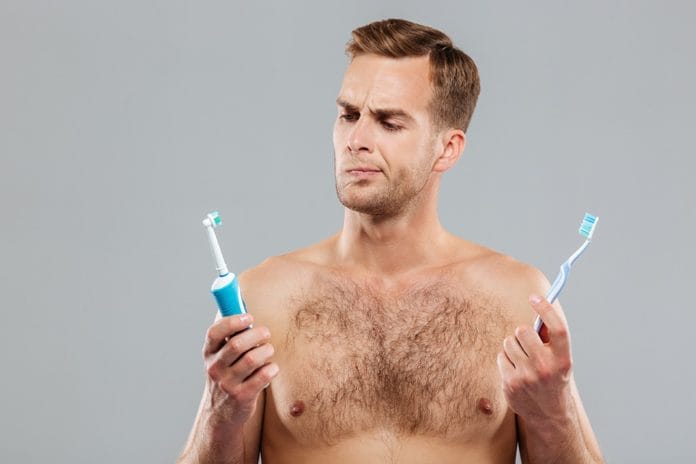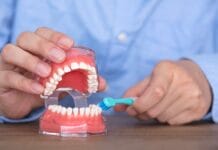Many dental hygienists probably give unsolicited advice to random strangers in the oral health aisle of the local superstore. Yes, you know who you are! Why give advice to only random strangers, though? You should be encouraging your own patients to purchase the devices, get them out of the box, and plug them in!
Recently, I was having a conversation with a family friend who has struggled with oral health issues much of her life. We often get into conversations about how to best take care of her teeth. Her youngest son made an impact on one of these conversations when he was discussing his recent hygiene appointment where the hygienist informed him about his periodontal health; she also recommended the use of a few new electronic devices for his home care.
At his next appointment, following the purchase of these devices, he was praised for no areas of inflammation, which made him a firm believer on what his hygienist was recommending. Additionally, another one of her sons was sent an electric toothbrush years ago and has likewise seen improvements!
As the conversation continued, I said to my friend, “You now have your new electronic device which should be helping.”
Much to my dismay, she told me she had not used it. I recently visited her house and saw it on the counter. So, I was under the assumption she was using the stinking thing! Nope! I was led astray by my assumptions, and we know where that leads us.
Are we assuming that because our patients tell us they bought an electronic device that they are using it or, more importantly, using it correctly? Sometimes, this is probably true.
Questions to Ask
As preventive specialists, we often play an investigator role. Moving forward, hygienists should ask patients these questions:
- Did you have an opportunity to purchase the electronic toothbrush (or other devices) we discussed at your last appointment?
- Have you had an opportunity to use it/them?
- Are you having any difficulty, or need any help?
- Have you purchased any replacement heads?
Let’s break down all these thoughts.
Did you have an opportunity to purchase the electronic toothbrush (or other devices) we discussed at your last appointment?
We often make recommendations with good intentions for patients, but they cannot afford the device or may be intimidated to go find the item. How can we navigate this better?
First, let’s ask the patient if trying the device is an option for them. If they cannot due to cost, perhaps finding a less expensive alternative may be better at the current time. If intimidation is the factor, having these items available in your office can reduce this barrier. Many times, I have seen patients be more than happy to purchase right from the office to avoid having to buy at a superstore.
Additionally, this allows the dental professional the chance to introduce the patient to their new device and review home care instructions.
Have you had an opportunity to use it?
Hooray! Your patient has purchased the device! Have they taken the device out of the box and plugged it in? Don’t be surprised if the answer is no! Once again, it could be the intimidation factor causing them to avoid the device like the plague. They are likely afraid to use it because it is something new.
If hygienists ask the above question, they can lead patients in the right direction to maximizing their investment while optimizing their oral health options. The purchase alone will not improve oral hygiene. Patients need to feel confident about their use of the device. I often suggest that they make it a goal to go home and plug in the device before the end of the day. I will even go so far as to offer to call them and check in on their progress with using the device.
Are you having any difficulty, or need any help?
How many times have you heard patients say their devices are too messy? Too many times to count. Be relatable to your patients. Let them know what you have encountered when using the devices and how you engaged in problem-solving. Give a short demonstration and give tips about avoiding any mess.
When you are relatable to patients, they will trust you and recognize that even professionals struggled at the beginning as well. Maybe they are not sure how to hold the device or to place the device in their mouths. Hygienists must take the time to educate patients on this, not just make the recommendations. As a dental hygiene instructor, it has given me a happy heart when I have seen my students choosing to pull up videos to show patients how to manage home care aids. What a brilliant way to use technology!
Sometimes patients may make comments about how much space a device might take up on their countertops. Again, help them solve these issues by removing these barriers to using what will ultimately help patients have a healthier mouth and overall body.
Have you purchased any replacement heads?
Lastly, it is vital that dental professionals check in on the replacement of tips and heads for the devices that they recommend. I have had patients using the same head for months and possibly years on end! What?!
One time a developmentally challenged patient was reportedly using an electronic toothbrush, but his plaque index indicated otherwise. I asked him to bring in his device so I could best direct him on the appropriate head. When he brought in the toothbrush, I immediately saw toothpaste caked on the head with extremely splayed bristles. It was disheartening to me that he had been trying so hard but has not been properly instructed to change his heads.
From that moment on, I decided that I would direct him at his three-month recare appointments to change his heads. What a difference this made for his oral health. Was it perfect? No, but it was an improvement!
Final Thoughts
One of the most rewarding benefits of being a hygienist is valuing oral hygiene instruction, which genuinely helps others to achieve their oral health goals. Taking time to ask questions that are sometimes outside the norm will aid patients in achieving these goals while garnering trust in their dental hygienist. Begin making it a habit to ask these questions when you recall recommending an electronic device. You will likely find out that their electronic device could make a great regift because it is in a closet, unopened.












